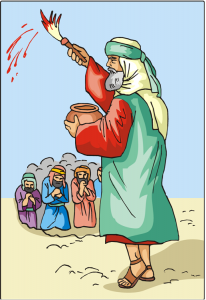Genesis 22:19; 23:2, Abraham dwelt at Beersheba…Sarah died in…Hebron. At this point, Abraham and Sarah lived in two separate towns some 50 miles apart. Why was this? The Scriptures don’s say, so we can only speculate. Perhaps the trial of Abraham’s faith in the previous chapter where YHVH asked him to sacrifice Isaac and Abraham’s compliance to do so put such a strain on their marriage that they separated. Perhaps the idea that YHVH would ask Abraham to sacrifice their only son was so hard for Sarah to believe that she questioned whether Abraham had even heard correctly from YHVH about this.
 Whatever the case, following YHVH can be tough on marriages and families as Yeshua notes in Matthew 10:34–39. Sometimes families split as a result. Abraham wasn’t unique in his situation.
Whatever the case, following YHVH can be tough on marriages and families as Yeshua notes in Matthew 10:34–39. Sometimes families split as a result. Abraham wasn’t unique in his situation.
In Exodus 4:24–26, in all likelihood, Zipporah and Moses split up over YHVH’s request to circumcise their two sons, for we never hear of Zipporah again, except that Moses had sent her away (Exod 18:2). Some Bible scholars take this mean that he put her away or divorced her (likely because of her refusal to follow him onto the mission field). Later, we find Moses remarrying a Cushite woman (who was likely black; Num 12:1).
David had to leave his first wife Michal, the daughter of Saul, because she despised him for dancing before YHVH’s ark of the covenant (2 Sam 6:14–16, 23).
The situation with the prophet Hosea is notable, as well, in this regard. YHVH required him to marry a wife of harlotry as part of his spiritual walk, so that he would better understand the experience of YHVH who was married to the adulterous nation of Israel. Hosea didn’t even know whether the children born to his wife were his own, or those of another man, yet he was to love her unconditionally anyway.
In the apostolic era, we hear virtually nothing about the wives of the apostles. This in no way indicates that their marriages were troubled, but one can only wonder given the rigors of the spiritual assignment YHVH had given them.
Paul is a case in point. He was likely married, since it would have been uncommon for someone of his spiritual stature to not to have been married in the Hebraic culture in which he lived, yet no mention of his wife is made. At the same time, he mentions a thorn in the flesh to buffet him and to keep him humble (2 Cor 12:7). On can only wonder if this isn’t a reference to a difficult marriage situation. Perhaps his wife became antagonistic at his conversion to Yeshua resulting in his leaving the prestigious and affluent life of the religious elite of his day, and counting his past life as dung (Phil 3:8). This may have been too much for her to bear.





